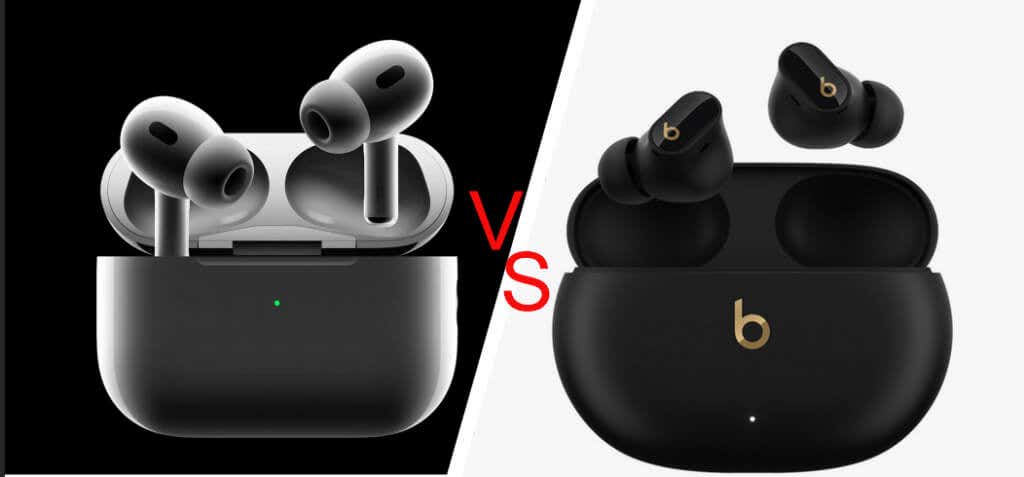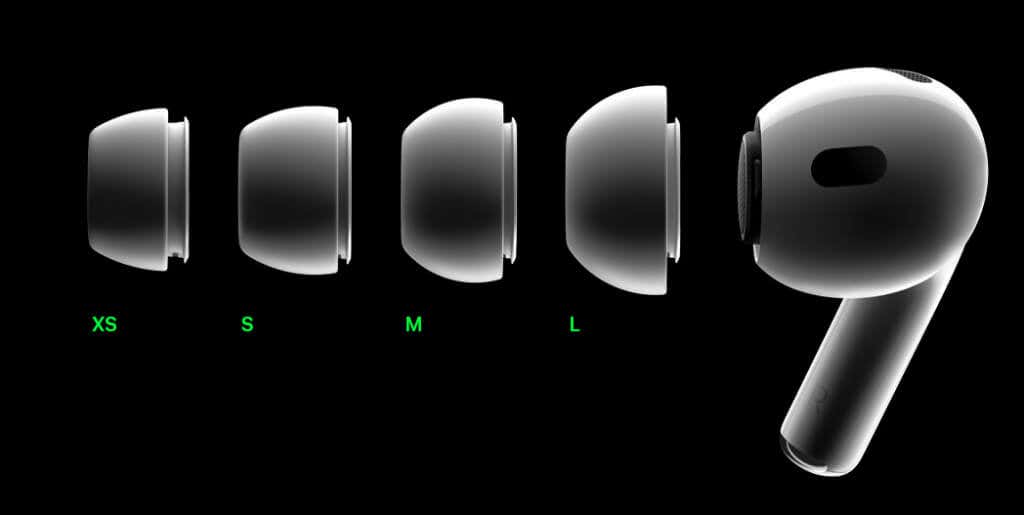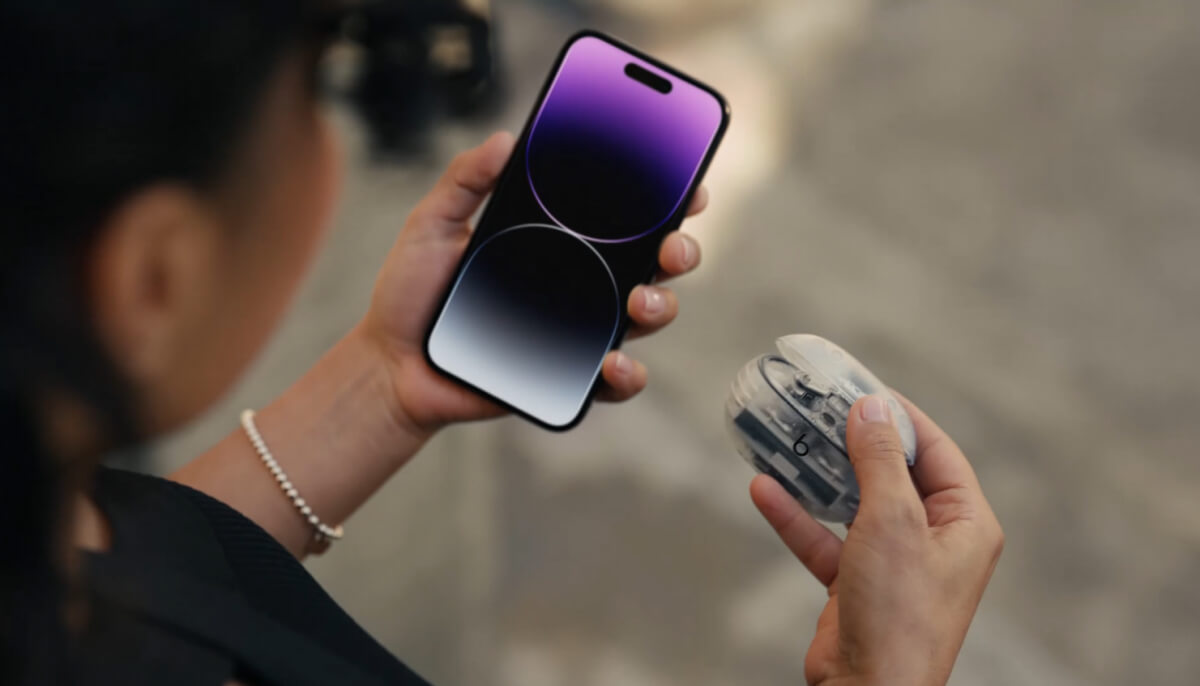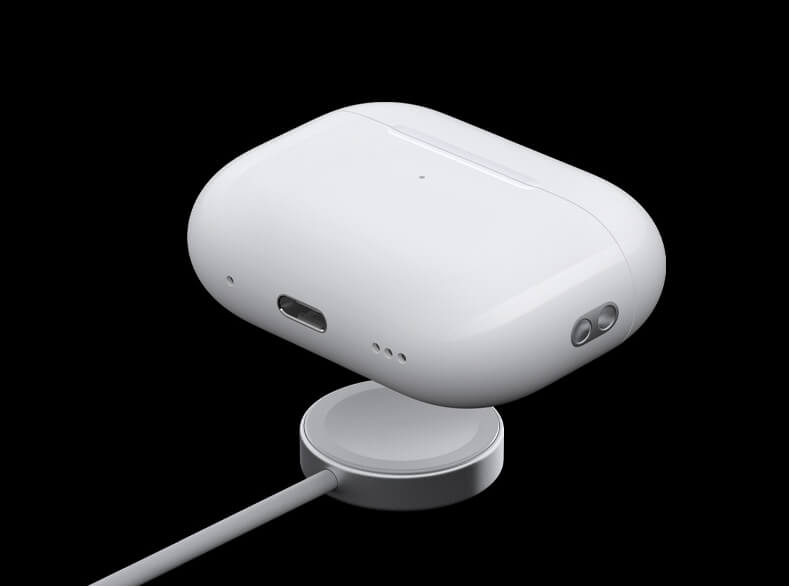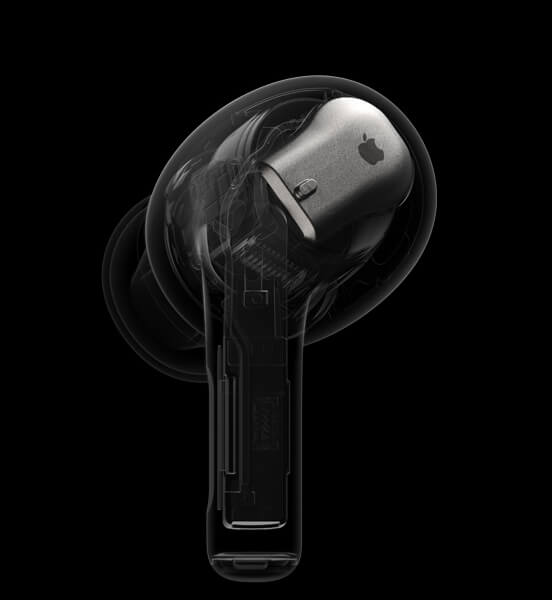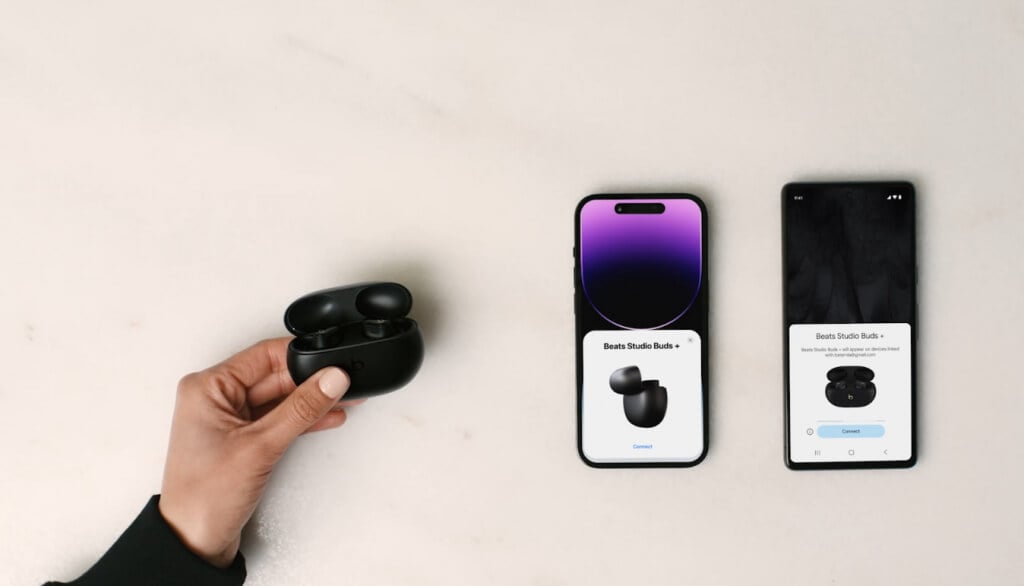We'll give you the bottom line
Trying to pick between Apple’s AirPods Pro and Beats’ Studio Buds? It’s like choosing between two top-rankers in the world of wireless earbuds. This article breaks down the differences and similarities to help you decide. We’ll help you make the right choice so you can buy the right earbuds for your needs.
Also, check out our in-depth comparison of Powerbeats Pro vs. AirPods Pro and Beats Fit Pro vs. Beats Studio Buds.
Specifications
| Beats Studio Buds+ | AirPods Pro (2nd generation) | |
| Battery Life | 6 hours or 9 hours (ANC on or off). 36 hours total. | 4.5 hours talking, 6 hours listening, 30 hours with the case. |
| Noise Cancellation | yes | yes |
| IP rating and water resistance | IPX4 | IP54 |
| Weight | 5g | 5.3g |
| Connectivity | USB-C, Bluetooth 5.2 | USB-C, Bluetooth 5.3, and Wireless |
| Sound Features | Spatial Audio, ANC, and Transparency Mode. | Personalized Spatial Audio, ANC, and Transparency Mode. |
| Chip | Proprietary Beats Chip (or H1 chip) | H2 Chip |
| Color | Black, Ivory, Transparent, Pink, Gray. | White |
| Price | 169.99 | $249.00 |
Design
When Apple acquired Beats, they didn’t change anything about the bud’s design. Why would they? The Beats Studio Buds look nothing like AirPods. Instead of having the stem pointing down, Beats has that recognizable pill shape that points upwards. That is not a coincidence. The pill-shaped part is a button you can click to control a call’s playback and noise cancellation.
On the other hand, AirPods have a touch-sensitive panel that does the same. Squeeze it to play or pause music, or swipe up and down to control the volume. Whether you prefer the button volume control or the touch-sensitive panel, it’s entirely up to you. Both perform equally well.
The AirPods and Beats Buds have a similar approach regarding comfort and fit. AirPods’ first generation was notorious for its ill fit, and Apple improved the design with AirPods Pro 2nd gen. It now comes with three different-sized silicone ear tips to put on the one that fits you perfectly.
The Beats Studio Buds also come with three different tip sizes, but PowerBeats Pro has a hook that you can put around your ear for even more security. These secure-fit ear hooks give the Beats Buds an edge regarding comfort and fit, especially when working out. However, other models of Beats Studio Buds don’t have the hook and rely on the same technology as Apple AirPods.
Sound Quality and Noise Cancellation
Regarding performance and audio quality, the AirPods Pro is the winner. However, the difference might be insignificant to an average listener. AirPods have a slightly richer sound that’s more refined and subtle. In comparison, the Studio Beats Buds have more treble, which is amazing if you prefer a more exciting sound.
The AirPods Pro uses Apple’s Adaptive EQ technology that tunes sound’s low and mid frequencies to the shape of users’ ears. The result is a vibrant and immersive listening experience. On the other hand, the Beats Studio Buds were designed to emphasize low-end frequencies. The result is a bass-heavy sound that some users prefer. That means that when it comes to sound quality, there’s no clear winner between Beats Studio Buds and AirPods. Your choice will depend on your listening habits.
However, if you’re an audiophile, you should know that neither of these true wireless earbuds will replace professional studio headphones soon, though both offer a truly satisfying listening experience.
AirPods Pro 2 offers active noise cancellation. They’re capable of cutting out the traffic noise and can make high-frequency sounds duller than the Studio Buds. But you should always be aware of your surroundings, especially in traffic. Complete noise canceling is not always the best option.
Beats are also great at noise canceling, though not quite at the same level since they lack active noise canceling. Nonetheless, your listening experience won’t get interrupted by environmental noise.
Phone Call Quality & Siri
AirPods and Beats Studio Buds integrate perfectly with Siri, and voice command functionality works great. Similarly, both of these wireless earbuds have crystal clear phone call audio that works amazingly paired with noise-canceling capabilities.
Although some users report Airpods Pro having a slightly better audio output, this is completely subjective. It’ll depend on your listening habits and the circumstances of each phone call.
Battery Life
Beats Studio Buds are the clear winner here if you need earbuds that’ll last you long enough. You can have up to 9 hours of listening time on a single charge. In comparison, AirPods Pro offers you only 4.5 hours. This is due to the lack of power-hungry ANC (active noise cancellation) features that AirPods have.
Beats Studio Buds and AirPods Pro have a charging case that uses USB-C or Lightning cable, depending on the model. Although Studio Buds doesn’t have a pocket-friendly case like AirPods, it can provide 90 minutes of playtime after only five minutes of charging. This is longer than the AirPod Pro case can pull off.
But when it comes to wireless charging, only the Airpods Pro case can do it. It also has an optional MagSafe connection, which Beats Studio omitted from their products.
Features
There is no doubt that AirPods Pro offers a more comprehensive set of features than Beats Studio Buds. But both earphones have their selling points.
AirPods Pro boasts the new ANC technology if noise canceling means a lot to you. They have an outward-facing microphone that detects environmental sounds. Then, the earbuds can counter the background noise with anti-noise technology. The result is a near-complete noise cancellation that immerses you in music or a podcast you’re listening to. The same technology works with phone calls so unexpected external sounds won’t interrupt your conversations.
Being completely unaware of the surrounding sounds is not always good, and that’s why AirPods Pro also boasts the Transparency mode. This feature allows ambient noise to pass through, so you are always aware of the environment while enjoying music, podcasts, or a phone call. The pressure-equalizing vent system makes the transition between ANC and Transparency Mode seamless. Although Beats Studio Buds also have the Transparency mode, it’s not as effective since the noise canceling doesn’t work the same way.
Both Beats Studio Buds and AirPods Pro have the Spatial Audio feature that offers a surround sound experience. When paired with audio content mixed in 5.1 and 7.1 surround sound technology and Dolby Atmos, the musical experience is truly immersive. The best is that the Spatial Audio of both Apple’s AirPods and Beats Studio Buds uses a gyroscope and accelerometer to map the position of the buds relative to your iOS device to provide directional sound.
Connectivity
Apple’s AirPods Pro 2nd generation uses the H2 chip, which provides a stable, low-latency connection with Apple devices such as iPhones or iPads. Android users must go through the Bluetooth settings to pair their devices with AirPods Pro. That’s now a problem for Beats Studio Buds that use Proprietary Beats Chip, designed to work seamlessly with iOS and Android devices.
Note that Powerbeats Pro uses Apple’s H1 chip, which although pairable with Android, can cause sound stutter. It’s similar to the AAC Bluetooth codec that both AirPods Pro and Powerbeats Pro use. It works well with iOS but can cause sound interruptions with Android devices.
The Bottom Line
After dissecting their features, performance, and user experiences, the choice ultimately boils down to your specific needs and preferences.
The Beats Studio Buds deliver impressive sound quality, active noise cancellation, and an attractive price point, making them a fantastic choice for music enthusiasts seeking a balanced audio experience. On the other hand, the AirPods Pro, with its seamless integration into the Apple ecosystem, top-tier noise cancellation, and excellent call quality, cater to those who prioritize the complete Apple experience.
Ultimately, your lifestyle, budget, and tech ecosystem will influence the decision. Both options offer exceptional performance, and you can’t go wrong with either.

